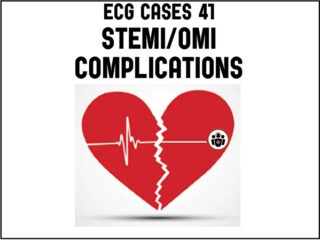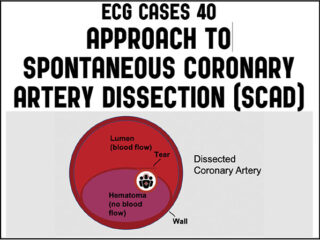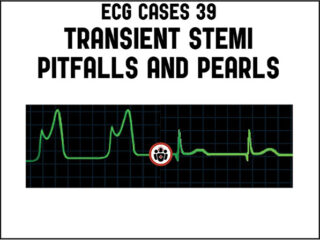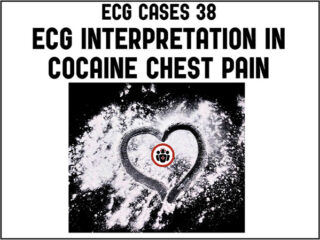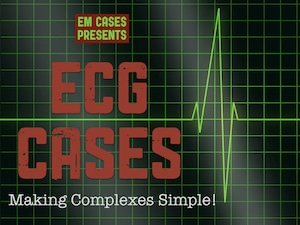
ECG Cases – Making complexes simple is a monthly blog by Jesse McLaren (@ECGcases), a Toronto emergency physician with an interest in emergency cardiology quality improvement and education. Each post features a number of ECGs related to a particular theme or diagnosis (with a focus on acute coronary occlusion), so you can test your interpretation skills. We challenge you with missed or delayed diagnosis, those with false positive diagnosis, and those that had a rapid and correct diagnosis. Cases are followed by a quick summary of the literature that relates to the cases, and we bring it home with practice changing pearls that you can use on your next shift.
Share your interesting ECGs with us!
ECG Cases 43 – ECG Interpretation in Shortness of Breath
In this ECG Cases blog we look at 10 patients with shortness of breath, and discuss how the ECG can be used to help diagnose cardiac, respiratory and metabolic emergencies. We discover that for STEMI/OMI vs subendocardial ischemia, we should look for STEMI(-)OMI, subacute OMI, and OMI in the presence of LBBB and RBBB, and consider the differential for diffuse ST depression with reciprocal ST elevation in aVR. For RV strain, acute vs chronic, we should look for signs of acute RV strain and chronic pulmonary hypertension. for low voltages we should consider pericardial effusion and other causes, and for hyperkalemia we should look for multiple signs of hyperkalemia as a guide for empiric calcium...
ECG Cases 42 – Approach to ECG Interpretation in Patients with Chest Pain: OMI, False Positive & Negative STEMI & Other Causes
In this ECG Cases blog we look at 10 cases of patients with chest pain, including false positive STEMI, false negative STEMI, and other causes to help hone your ECG interpretation skills in time-sensitive cases where those very ECG skills might save a life...
ECG Cases 41 – STEMI, Occlusion MI Complications
How can we use the awareness of complications to identify false positive STEMI and Occlusion MI that doesn’t meet classic STEMI criteria, and consider specific treatment? Dr. Jesse McLaren reviews the complications of MI through 10 ECG cases and how they alter management...
ECG Cases 40 – Approach to Spontaneous Coronary Artery Dissection (SCAD)
Dr. Jesse McLaren on when to consider Spontaneous Coronary Artery Dissection (SCAD), which patients are at risk for reocclusion, and the challenges of diagnosing SCAD in patients who have nonischemic ECGs despite silent occlusion, occlusions perfused by collaterals, or from non-occlusive MI on this ECG Cases...
ECG Cases 39 – Transient STEMI Pitfalls and Pearls
In this ECG Cases blog we look at 9 patients with possible transient STEMI and discuss pitfalls and pearls in ECG interpretation and management...
ECG Cases 38 – ECG Interpretation in Cocaine Chest Pain
Dr. Jesse McLaren discusses some key aspects of cocaine chest pain ECG interpretation in this month's blog including: Patients with cocaine-associated chest pain require benzodiazepines +/- nitroglycerine for symptom relief, aspirin and ECG to look for signs of occlusion and reperfusion. In patients with chest pain + ST elevation, consider false positive STEMI including early repolarization, LVH and Brugada-pattern. In patients with cocaine chest pain who are STEMI negative, beware STEMI(-)OMI including subtle ST elevation, hyperacute T waves, reciprocal change, and refractory ischemia. For cocaine chest pain patients who's chest pain has resolved, look for reperfusion T wave inversion, as this may put them at risk for reocclusion.



